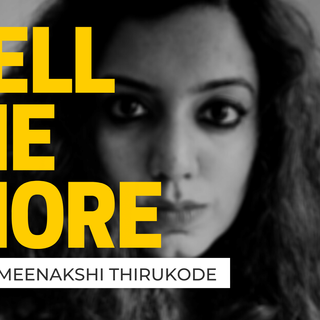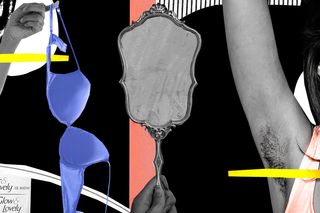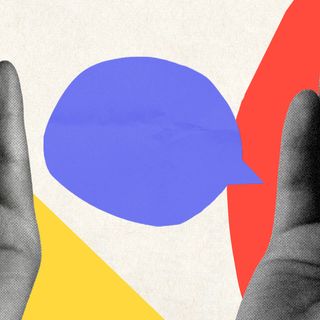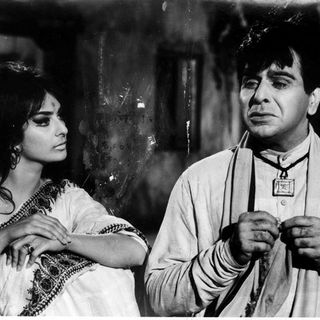
Beauty Norm Rebellions in 2020 Redefined Beauty — But Didn’t Eliminate It
The pandemic ushered in a more relaxed look — but a ‘look’ nonetheless.

As the world went into lockdown in 2020, people found themselves suddenly free of the external gaze of social life. We began to explore ‘getting ready’ (if at all) for ourselves, to shed conventional norms, and, slowly, our relationships with beauty evolved, became more personal — more of a choice than an obligation.
But a choice does not preclude an ideal. Although much has been said about how 2020 may lead to long-term changes in beauty norms, the concept of beauty remains intact — desirable even. Terms like ‘pandemic slob-chic,’ as well as an increase in ‘no-make-up make-up’ tutorials, suggest the norms have only changed, not disappeared.
Perceptions of beauty have always been informed by historical events, reimagining the standards without challenging the underlying issue. After World War I, women moved away from Gibson-girl pompadours — an ideal of feminine attractiveness — to bobs that were easier to achieve and maintain. But soon, bobs were the fashionable norm, the standard for beauty and chicness.
This time, however, some expect the Covid19 pandemic period to signal something different for the future. Some commentators believe the changes in beauty norms could mark a long-term shift in how we dress and how we think about our appearance. “People over the last year have developed a new way of being, a new way of defining who they are, maybe prioritizing themselves a little bit more and their comfort, because we need that… People feel like they don’t need the social feedback as much. … It’s going to be hard to get people back into those uncomfortable clothes after a really long time of being in very comfortable clothes,” Daniele Fay Mathras, an associate teaching professor of marketing at Northeastern University in the U.S., who studies the minimalism movement, said in an interview.
As working from home became the norm amid the pandemic, the pressure to be ‘presentable’ vanished. Months of quarantining at home led women worldwide and in India to question accepted practices — notably that of wearing a bra.
In fact, the trend of going bra-less gathered so much momentum that some lingerie brands began trying to convince people how important bras are to women’s health and wellbeing (a claim that has been thoroughly debunked).
Related on The Swaddle:
People Recall the First Time They Felt They Weren’t Beautiful
The shift in beauty ideals has continued post-lockdown, with people moving away from what they considered, pre-Covid, beauty essentials. The early phase of the lockdown witnessed Twitter buzzing with posts about “bushmen eyebrows” and “broken nails” as people were cut off from their standing appointments at neighborhood salons and with parlor didis. But as the lockdown lifted, the lowered expectations in a world grappling with a pandemic gave some people an opportunity to reconsider the standards they previously aspired to.
“I didn’t get my eyebrows done for a good five months in the beginning and surprisingly got compliments on the thick dark brows. … So, I don’t get them [done] as often now. From once in 20 days, I have started getting them once in two months,” says Varsha, 28.
Earlier, to look “Insta-worthy,” Vrushali, 23, always wore BB cream, but now, that has changed. “I leaned in towards natural beauty, and now, my whole perspective has changed…. A kind of self-acceptance in its true sense has come along, and my skin feels better, too,” she says.
But moving away from existing ideals, and accepting newer ones as ‘also beautiful’, runs the risk of falling prey to the same cycle, in which one beauty norm just replaces another while beauty itself remains the goal. “So much do we value beauty, and the privileges it affords, even emerging movements that seek to democratize physical appearance can’t shake the hierarchy they aim to upend,” wrote The Swaddle’s culture editor Rajvi Desai last year in an exploration of a post-beauty world.
Related on The Swaddle:
Study: People Find Women Wearing Make‑up More Trustworthy
But the focus on comfort amid pandemic lockdowns has the potential to disrupt the cycle. Some people, like Smriti, 30, are rejecting the concept of beauty by prioritizing physical comfort instead. “I get a lot of shit from a friend for not getting waxed anymore. But, it doesn’t bother me now. I mean, why get waxed? Accept the hair. It keeps me warm,” she says.
The pandemic has allowed others to question the perceptions of others — redefining beauty by their own perception. “I recently stopped listening to parlor ladies asking me to get ‘detan facials’ because my skin has ‘tanned.’ I spent eight months staying indoors under lockdown — how on earth can I be tanned? So now, I’ve started telling them I’m not tanned, my skin is dark, and there’s nothing wrong with it… I did this yesterday at a parlor, in front of other customers,” said Aishwaria, 26.
This replacing of the external gaze with an internal acceptance and advocacy has had large-scale effects. Influenced by the #BlackLivesMatter protests that originated in the U.S., Indians started confronting their cultural colorism. Online activism led Shaadi.com to remove a search filter on its website that allowed people to look for potential matches based on skin tone, and Unilever decided to remove “fair” from the name of its Fair and Lovely fairness cream, rebranding it as Glow and Lovely. While these changes may be superficial at best, the lockdown prompted personal resistance and public discourse around colorism, changing individual choices and popular products.
But even as beauty remains the goal — is its redefinition here to stay? Some experts are unsure. “Humans are social creatures, we compare and adapt. Once things get back to the way they were before the pandemic, it’s possible that we may fall back to old patterns,” says Ankita Jain, a Hyderabad-based psychologist. However, she adds that if working from home continues for years, we may see some long-term changes. Moreover, “with salary cuts and reduction in benefits, people may reconsider their spending habits, with beauty getting de-prioritized,” she adds.
“Historically, pandemics have forced humans to break with the past and imagine their world anew. This one is no different. It is a portal, a gateway between one world and the next,” Arundhati Roy, novelist, told the Financial Times. Going into 2021, as we continue challenging old beauty norms, we can consider questioning the idea of beauty itself, redefining how we see ourselves in the next, post-pandemic world.
Devrupa Rakshit is an Associate Editor at The Swaddle. She is a lawyer by education, a poet by accident, a painter by shaukh, and autistic by birth. You can find her on Instagram @devruparakshit.
Related


Pass It On: You Can Bounce Back From A Negative Performance Review
